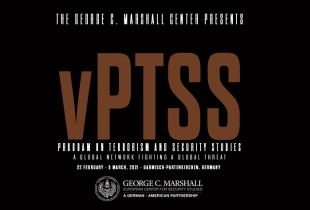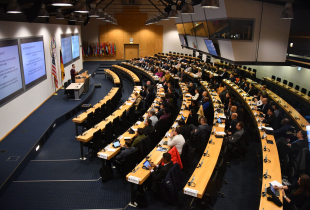
Marshall Center Alumni Network Reboots, Reconnects to Answer Cyberterrorism Alarm
By Christine June
Public Affairs Office
George C. Marshall European Center for Security Studies
GARMISCH-PARTENKIRCHEN, Germany (May 2, 2016) – The recent community of interest workshop held April 25 to 28 at the George C. Marshall European Center for Security Studies rebooted its alumni network by reconnecting 59 cyber and counterterrorism professionals working in government and civilian agencies from 39 countries.
The Global Security Alumni Community of Interest Workshop explored the topic of Countering Terrorism: Cyber Strategy Solutions to Protecting Critical Infrastructure.
“This workshop is focused on international, multi-stakeholder security concerns in the cyber domain,” said Austrian Army Col. Gottfried Salchner, the deputy director of the Marshall Center’s Program on Cyber Security Studies. “It addresses the various cyber challenges and threats that must be considered when developing a secure cyber enterprise across the whole-of-government in support of national defense and security.”
Most of the workshop participants, as well as some of the speakers, were Marshall Center alumni from the Program on Cyber Security Studies, Program on Terrorism Security Studies or other resident programs.
“This workshop is amazing,” said Anna Gussarova, senior research fellow at the Kazakhstan Institute for Strategic Studies and a Marshall Center alumna since 2013. “The agenda is impressive, and they are binging so many familiar people to discuss cyber security. It shows that the alumni network is still growing and growing.”
“How real is the cyber terrorism threat, and how much should we worry about it,” asked Ayhan Gücüyener during her presentation on Energy Critical Infrastructure and their Vulnerability to Terrorist Attacks on April 27.
“No single instance of real cyber terrorism has been recorded, but,” Gücüyener stressed, “Cyber terrorism is more than a theory and could cause physical harm to Critical Energy Infrastructures.”
Gücüyener has been a researcher for the Center on Foreign Policy and Security at the Hazar Strategy Institute in Istanbul for three years. This was her first visit to the Marshall Center.
“First thing I noticed about the Marshall Center is that everyone stresses a-whole-of- government approach and sharing best practices throughout the world,” said Gücüyener. “I believe these approaches are the best platform to understand the global problems. We can make global solutions if we can understand the global problem.”
As part of the Marshall center’s Program on Cyber Security Studies, this workshop’s design included guest lecturers from global cyber security agencies and organizations and course seminar activities to examine current cyber security challenges and discuss practical and pragmatic ways to improve regional and international cooperation to effectively counter cyber threats.
A few of these cyber organizations were the NATO Cooperative Cyber Defense Centre of Excellence (CCD COE), U.S. Secretary of Defense for Cyber Policy and Cyber Security, Lithuanian Ministry of National Defense’s Cybersecurity and Information Technologies, Polish Government Centre for Security, Bavarian State Police, U.S. Federal Bureau of Investigations’ National Cyber Investigative Joint Task Force and U.S. Department of Justice.
“Most conventions or international treaties were drafted in times when cyberterrorism was considered science fiction,” said Lorena Trinberg, a Marshall Center PCSS alumna and a legal analyst of German and Colombian descent at the NATO CCD COE in Tallinn.
“The last few decades have been marked by massive growth of the internet – more than three billion internet users today – interconnectedness of computer systems, interdependencies of critical infrastructure and emergence of new vulnerabilities,” said Trinberg in her presentation on Legal Aspects of Cyber Terrorism on April 26.
She added that policy makers and stakeholders have reacted with an unknown number of legal acts and frameworks for the prevention of harm caused by cyber-related acts, including the criminalization of these acts.
“The mind-breaking challenge for non-lawyers is combining the technical and legal aspects of cyber-related activities,” Trinberg said.

